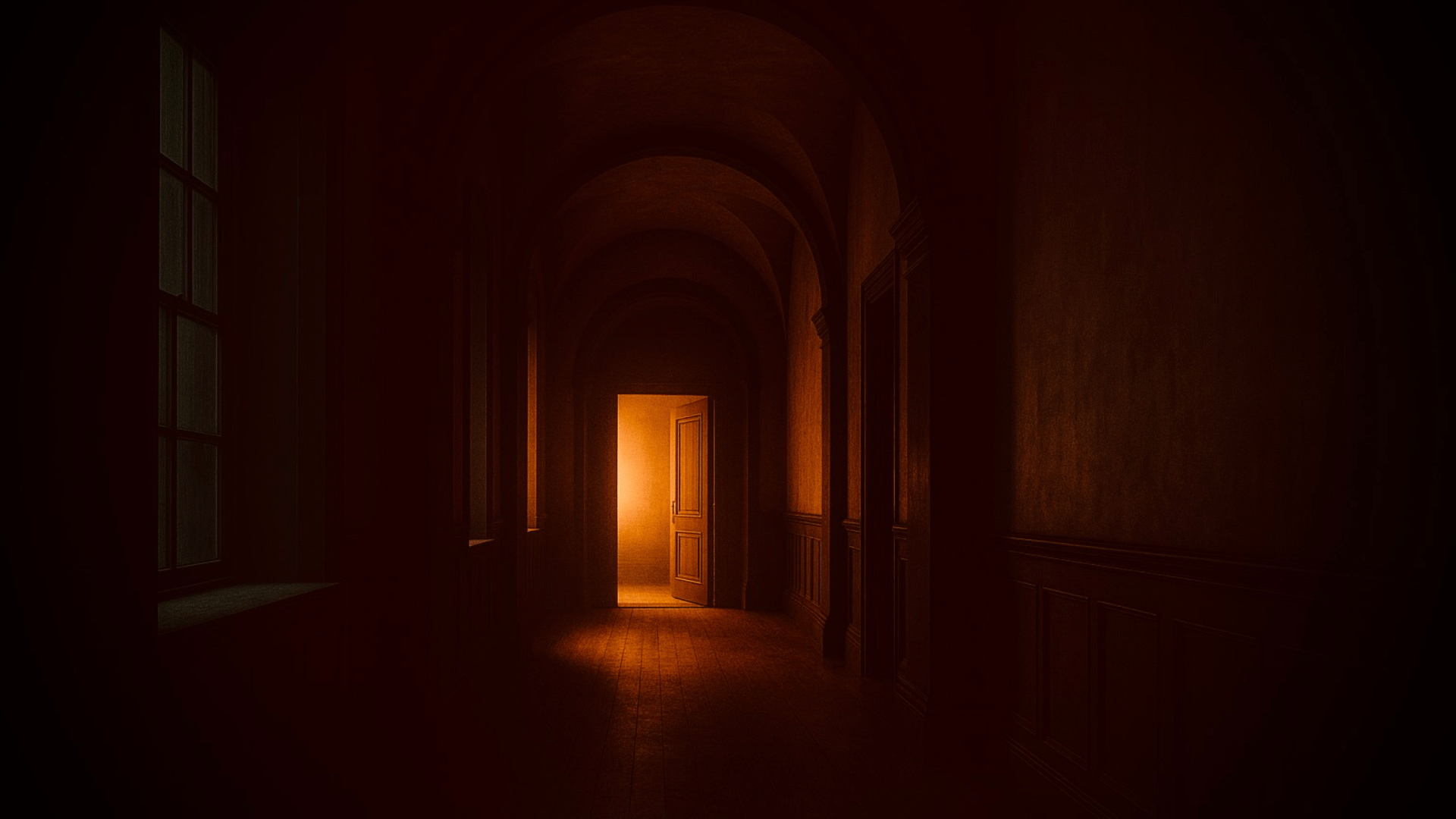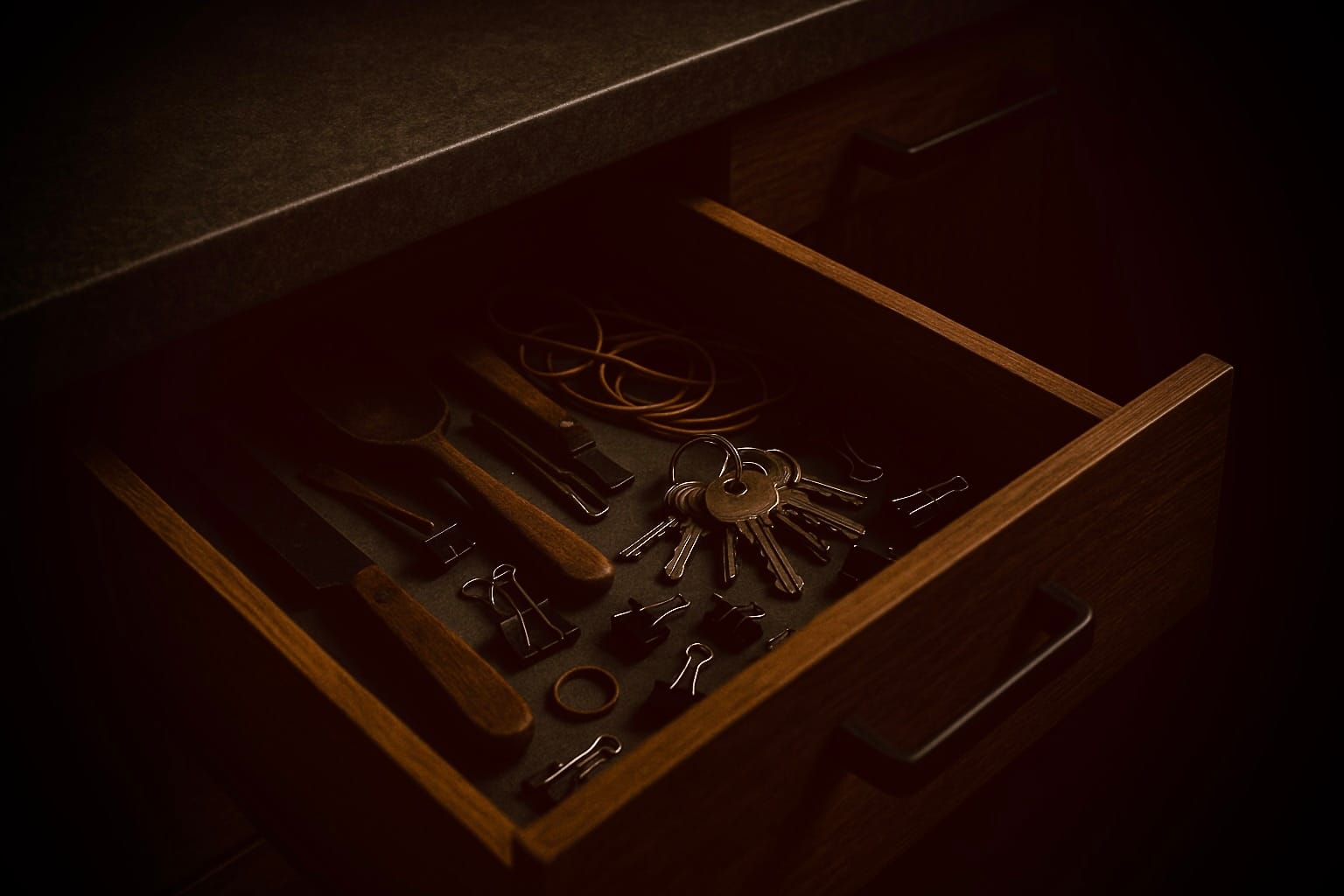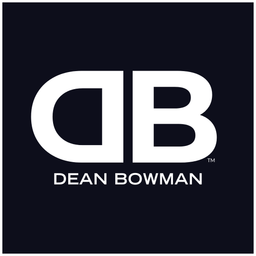Of Knowing and Unknowing
There’s a drawer in the kitchen that doesn’t open all the way.
It stops three-quarters through. Like it’s keeping a secret it doesn’t quite trust me with. Teasing me with some half-truth it may not fully know or understand.
It isn’t broken—just hesitant. I’ve never tried to force it. Instead, I let it come as far as it wants, then reach in at an angle, fingers navigating the dark edge where things go to hide or retreat.
This is the drawer that holds the almost-useful things: rubber bands that have gone brittle, two mismatched batteries of uncertain charge, a single ring of keys to things I can't remember. It’s more shrine than storage.
Sometimes, in the late hours between work and whatever comes after, I open it just to hear the sound. That quiet wooden resistance. The way it sighs against itself. It seems to be reluctant to open and, in some odd way, desires to be opened. As if it’s uncertain which state of being it prefers and finally settled on both—neither opened nor closed.
There's a folder on my work laptop that belonged to my predecessor. No one mentions her name. No one explains why she left. When I open it, I find documents dated just days before I started—project files that stop abruptly, meeting notes that trail off. She exists only in these digital fragments, present through her digital echo. Like the drawer, I feel it’s trying to tell me something. What exactly? I can only guess. An item for later, perhaps? These things have ways of resurfacing when I least expect them.
This morning, as I was probing the drawer for a usable rubber band, I found an old recipe folded into quarters last night. No date. No details. Just a list of ingredients and a few ink-blurred lines that might once have meant something. It felt like finding a ghost mid-sentence. It wasn't my mother's. She hid her secrets between the pages of books, pressed flat like flowers that had lost their color. This one was stuck inside the drawer's frame, folded into quarters, as if someone wanted to make it disappear without throwing it away.
I don't know who owned this house before I arrived. It had been empty for some time, carrying the same quality of careful absence as my predecessor's folder. I suspect the owner moved away, moved on, or passed away, leaving behind only these folded traces—making the recipe and its home in the drawer even more intriguing.
Across the street, another house sits between states—workers bustling in and out all week. Electrician, plumber, cleaners, and so forth. My neighbor had kept his front window 3/4 closed. I never knew why. I didn’t know him. Never spoke with him. Is he gone? If so, how long ago?
I return to the kitchen. This time, in search of a small binder clip. Drawers like this are time capsules disguised as nuisances. They collect the moments we don’t know how to categorize—the half-decisions, the paused intentions, the fragments of days that never resolved. And most things in life, I have found, never resolve.
I never really knew my family's past, or my parents for that matter. My personal and family history began at birth. Photos and stories of what came before me were scant, if nonexistent. Life without history seems convenient in the moment, but swells later in life into an overwhelming crescendo of questions—most of which can never be answered. Will never be answered.
There’s a small wedding photo of my parents. One and only one photo. And only the two of them in the frame. No date. No location. I had asked. They never told me. Just dismissed my questions with the usual “Oh, you don’t need to know that. It was so long ago anyway.” My parents kept many secrets. Secrets that died with them, leaving me in the all-pervasive half-knowing state I’ve known since childhood—an in-between state of existence most people would likely find completely alien. But this is my norm. I neither like nor dislike it. It just is. A reality I’ve learned to accept. A reality that asks nothing of me nor I of it.
To an outsider, the in-between may seem confining. But to its inhabitants, it is freedom.
Perhaps Dickinson understood this, too. She wrote of dwelling in possibility—finding liberation in spaces that might seem restrictive to others. She may have known the nature of in-between spaces, where uncertainty becomes presence—a quiet, cryptic force of its own.
Like her, I’ve learned that the spaces between knowing and not knowing can hold more possibility than certainty. More possibility lives in the drawer that won't quite open than in one that reveals everything at once. A precious treasure, both tiny and ordinary.
The house across the street is between emptying and filling. Had it not been so, I would not have noticed. A For Sale sign now sits tall out front, swaying in the breeze. The 3/4 shade now stands pulled all the way up. The house has joined me here on the edge of uncertainty, between what was and what will be.
The drawer, the work documents, the neighbor’s house: I don’t organize them. I don’t delete them. I don’t ignore them. I let them layer, filling me with possibility. Haunting me with their futures—both present and lost.
And somehow, in their reluctance to fully share their secrets, they remind me that not everything needs revealing. Some parts of a day, like some thoughts, prefer to remain just out of reach. Equal portions of bliss and uncertainty here in the in-between knowing and unknowing of things.
That, too, is a kind of presence I hold dear.
— Dean Bowman
Friday, 6 June 2025




